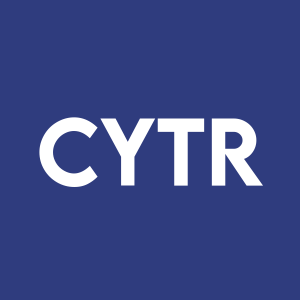CytRx Notes Orphazyme’s Announcement of Topline Results from Trial for Arimoclomol in the Treatment of Inclusion Body Myositis
CytRx Corporation (OTCQB: CYTR) reports on Orphazyme A/S (NASDAQ: ORPH) announcing that its phase 2/3 trial of arimoclomol for inclusion body myositis (IBM) failed to meet primary and secondary endpoints. The trial involved 150 patients at 12 North American and European sites. Patients were given either arimoclomol or a placebo over 20 months. No major safety concerns were found, but the results highlight the challenges in developing effective treatments for IBM. CytRx continues to monitor developments with Orphazyme regarding their agreement on arimoclomol.
- No significant safety concerns were identified in the trial.
- Orphazyme's trial did not meet primary and secondary endpoints.
- The failure of arimoclomol in the trial raises questions about its effectiveness for IBM.
Insights
Analyzing...
CytRx Corporation (OTCQB: CYTR) ("CytRx"), a specialized biopharmaceutical company focused on research and development for the oncology and neurodegenerative disease categories, today noted that Orphazyme A/S (NASDAQ: ORPH) ("Orphazyme") announced that its phase 2/3 trial evaluating arimoclomol for the treatment of inclusion body myositis (“IBM”) did not meet its primary and secondary endpoints. According to Orphazyme, the primary goal was to evaluate the treatment effect on disease progression as measured by the inclusion body myositis functional rating scale.
Orphazyme announced earlier this week that the randomized, placebo-controlled trial was conducted among 150 IBM patients at 12 sites in North America and Europe, in partnership with University College of London and the University of Kansas. Participants were randomized (1:1 ratio) to receive either arimoclomol citrate (400 mg three times daily) or placebo for up to 20 months. No important safety concerns were detected in the trial. The analysis of the data is continuing and complete findings from the study will be shared in a future scientific forum.
Orphazyme’s interim Chief Executive Officer commented: “We continue to believe in the promise of arimoclomol and heat shock protein science and are fully committed to our mission to deliver new therapies to patients.”
CytRx will continue to provide updates that are relevant to our agreement with Orphazyme.
About CytRx Corporation
CytRx Corporation (OTCQB: CYTR) is a biopharmaceutical company with expertise in discovering and developing new therapeutics principally to treat patients with cancer and neurodegenerative diseases. CytRx's drug candidate, arimoclomol, was sold to Orphazyme A/S (Nasdaq Copenhagen exchange: ORPHA.CO) in exchange for milestone payments and royalties. Orphazyme is developing arimoclomol in four indications including Amyotrophic Lateral Sclerosis ("ALS"), Niemann-Pick disease Type C ("NPC"), Gaucher disease and Inclusion Body Myositis ("IBM"). Learn more at www.cytrx.com.
About Orphazyme
Orphazyme is a biopharmaceutical company focused on bringing novel treatments to patients living with life threatening or debilitating rare diseases. Their research focuses on developing therapies for diseases caused by misfolding of proteins including lysosomal storage diseases. Arimoclomol, the company’s lead candidate, is in clinical development for four orphan diseases: Niemann-Pick disease Type C, Gaucher disease, Inclusion Body Myositis, and Amyotrophic Lateral Sclerosis. Orphazyme is headquartered in Denmark and has operations in the U.S. and Switzerland. Orphazyme shares are listed on Nasdaq (ORPH). For more information, please visit www.orphazyme.com.
About Arimoclomol
Arimoclomol is an investigational drug candidate that amplifies the production of heat-shock proteins (HSPs). HSPs can rescue defective misfolded proteins, clear protein aggregates, and improve the function of lysosomes. Arimoclomol is administered orally, crosses the blood brain barrier, and has been studied in seven Phase 1, four Phase 2 and one pivotal Phase 2/3 clinical trial. Arimoclomol is in clinical development at Orphazyme for the treatment of NPC, Gaucher disease, IBM and ALS. Arimoclomol has received orphan drug designation for NPC, IBM and ALS in the US and EU, as well as fast-track designation from the US Food and Drug Administration (FDA) for NPC, IBM and ALS. In addition, arimoclomol has received breakthrough therapy designation and rare-pediatric disease designation from the FDA for NPC.
Forward-Looking Statements
This press release contains forward-looking statements, including statements relating to the potential receipt of EMA and FDA approval of arimoclomol, the Company’s potential receipt of future milestone and royalty payments from Orphazyme and the achievement of long-term value for the Company’s stockholders. Such statements involve risks and uncertainties that could cause actual events or results to differ materially from the events or results described in the forward-looking statements, including risks and uncertainties relating to the ability of Orphazyme to obtain regulatory approval for, manufacture and commercialize its products and therapies that use arimoclomol; the results of clinical trials involving arimoclomol; the amount, if any, of future milestone and royalty payments that we may receive from Orphazyme; and other risks and uncertainties described in the most recent annual and quarterly reports filed by the Company with the SEC and current reports filed since the date of the Company’s most recent annual report. All forward-looking statements are based upon information available to the Company on the date the statements are first published. The Company undertakes no obligation to publicly update or revise any forward-looking statements, whether as a result of new information, future events or otherwise.
View source version on businesswire.com: https://www.businesswire.com/news/home/20210401005850/en/






